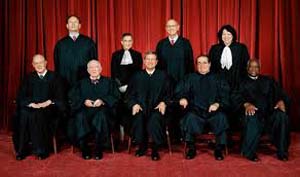
NEW YORK (Press Release)– AJC regrets the U.S. Supreme Court decision in Town of Greece v. Galloway. In a 5-4 decision, the court ruled that the town board may continue to begin its meetings with a prayer. Historically, those prayers have been almost exclusively Christian, a practice that prompted the lawsuit.
AJC, in an amicus brief, had urged that the court find unconstitutional the town’s use of prayers because they suggest that government prefers one faith, in violation of the Establishment Clause.
“Today’s Supreme Court decision is regrettable in not insisting that those prayers be required to reflect our nation’s religious diversity,” said AJC General Counsel Marc Stern.
Stern noted that the dissent in the Supreme Court decision “had it right when they said that the Town’s opening prayer practice, which favored the Town’s Christian majority, failed to comply with the ‘remarkable guarantee’ embodied in the Constitution.”
“When the citizens of this country approach their government, they do so only as Americans, not as members of one faith or another,” wrote Justice Elena Kagan for the minority. “[T]hey should not confront government-sponsored worship that divides them along religious lines.”
The majority of the court, however, argued that since the Town did not intend to slight its non-Christian citizens, the Constitution was not violated. Citizens are more concerned with what government does than with what some anonymous bureaucrat intended, AJC observed.
Despite our disappointment with the result, Stern noted, there is an important silver lining in the majority decision:“Those who would deliberately limit legislative prayers to those of the dominant religious group—or use legislative prayers to attack or proselytize others—have been told by the Court that they will find no solace in the Town of Greece decision,” said Stern.
*
The Jewish Council for Public Affairs issued this comment: “Today’s Supreme Court decision allowing sectarian prayer before public meetings was an erosion of the Bill of Rights and its protections, said the Jewish Council for Public Affairs. The case, Town of Greece v. Susan Galloway and Linda Stephens, was narrowly decided by a vote of 5-4 in favor of the town’s right to open public meetings with a prayer. The JCPA joined an amicus brief with the American Jewish Committee in opposition to the Town and in support of existing precedents regarding separation of religion and state.
“A guiding principle in our democracy is that no group or individual feels that the government prefers one religion over another. The First Amendment protections are intended to ensure just that. Beginning our public meetings with a sectarian prayer can make some feel excluded. It is not the way to achieve a strong, dynamic, and inclusive union,” said JCPA President Rabbi Steve Gutow. “We believe strongly in the importance of each us being free to worship and practice our own religion as we choose. That freedom contributes to our success as a diverse nation. But one should not have to participate in another’s religious practice in order to take part in civic activities.”
“We are very disappointed in this decision which diminishes The Bill of Rights and erodes 60 years of understanding of the Establishment Clause,” said JCPA Chair Susan W. Turnbull. “The Court today opened the gates to reconsidering years of legal precedents and court decisions. We are concerned that this could mark a turn towards more religion in the public arena which could discourage the participation of minority groups.”
*
Preceding provided by the American Jewish Committee (AJC), and Jewish Council for Public Affairs.
I believe the Supreme Court majority made a grievous and heinous error in its judgment. We should be free from religious coercion by majority faiths. All prayers should be nonsectarian if they are going to be held in a public institution.
I think this latest decision by the conservative wing of the Supreme Court is especially outrageous in view of the rising tide of anti-semitism in Eastern Europe and elsewhere. To allow the invocation of “Jesus Christ as Lord and Saviour” at the opening of an official public meeting is horrifying on its face when one is reminded of the thousands of Jews and others tortured and persecuted during the Inquisition and Pogroms and other periods in human history. If we cannot turn to the “Supreme Court” to protect individual liberty and to keep our freedom strong, to whom and to what can we turn. “For Shame” I say, “For Shame!”
Harriet Forman’s comments are spot on. By invoking a particular God by name, such as Jesus, the chaplains make citizens with different beliefs who attend these meetings guests rather than the equal citizens they are supposed to be. I believe it was George Washington who made a distinction between tolerance by the majority of minorities and acceptance and equality for all.
The House and Senate, as I understand it, have have invocations. Being a minority religion I have to assume the preponderance of invocations are made by ministers and priests. If the federal government can do this, why not more local governmental bodies? Are you so shaky in your beliefs that just hearing a priest or minister is going to damage your beliefs? Their is no antisemitism involved here, just people trying to apply their belief system to serving others.
Coming from a strictly secular country in Europe I cannot figure out why the concept of “separation of church and state” is so porous in the US.
In fact whatever that separation is seems to be eroding as witness this latest Supreme Court ruling.
There is no state religion but there clearly is a presumptive Christian societal bias
I agree with the decision. They chose local clergy. There was no payment or contractual arrangement. I don’t think this violates neutrality. No law mandates the prayers, nor prohibits them.